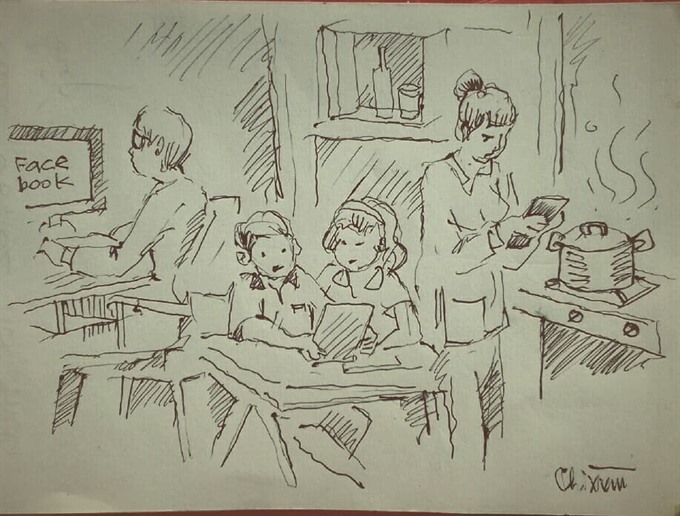 Talk Around Town
Talk Around Town

The clip is only three minutes long, but it has Vietnamese parents up in arms: it depicts young Vietnamese children who started studying English at a very early age, even before they fluently spoke their mother tongue, struggling to express themselves in either language.
 |
| Illustration image by Đỗ Minh Chí |
by Khánh Linh
The clip is only three minutes long, but it has Vietnamese parents up in arms: it depicts young Vietnamese children who started studying English at a very early age, even before they fluently spoke their mother tongue, struggling to express themselves in either language.
The clip immediately sparked a debate on the unforeseen impacts of early foreign language education among parents. The largest concern is that foreign language study for children under three can raise the risk of language disorders. Some children end up struggling with Vietnamese or need to work with a language therapist.
Parents’ comments revealed their worries. They had considered it essential to teach their kids to sing English songs and learn simple words on Youtube or via learning software—but now they are trying to decide if there’s a downside. Some said they would keep their children from studying English until they were in the first grade.
Nguyễn Thùy Hương, a mother in Hà Nội’s Đống Đa District, said she had allowed her two-year-old daughter to watch short English cartoon video clips everyday to help her get familiar with the language. But she has changed her mind.
“I can’t speak English, so I let her see the clips with an accurate and standard voice. But there’s no need to hurry,” she said.
It’s understandable why parents are so concerned about the language disorders that might be caused by early foreign language study. Living in a country where English is a foreign language and the ability to communicate in English unlocks opportunities for education and career, many parents attempt to let their children get familiar with English as soon as they can. For many parents, foreign language study is a vital part of ensuring a better future for their children.
But some parents now fear foreign language study will lead to communication disorders, bad behaviour, and poor performance at school.
The question is: Does learning a foreign language at an early age increase the risk of language disorders among children?
Nguyễn Mỹ Linh, my cousin, said she talked to her three-year-old son in both English and Vietnamese at the same time, and the boy could understand both languages.
“He sometimes uses words from both languages in the same sentence. It’s normal for bilingual children,” she said.
In most multi-cultural families, children are exposed to more than one language from the time they are born, and they speak these languages naturally. My neighbour, a Vietnamese woman, married an Israeli man. Their daughter has been able to speak Vietnamese and Hebrew fluently since she was small. She is now studying English without any difficulties.
“Children all over the world learn more than one language all the time,” she said. “Learning another language can hardly worsen language problems.”
Many education experts have agreed. Trần Thị Ái Liên, an education expert and a founder of a language centre for children between three and six years old said many parents mistakenly thought that children who learnt English before becoming fluent in their mother tongue would later have troubles using their mother tongue.
In fact, children can study up to five foreign languages at the same time as long as they understood what they said.
Đào Xuân Hoàng, a founder of Monkey Junior, an English learning software developed for children under six, said that currently, there was no scientific research reporting bilingual education could increase the risk of language disorders.
According to experts, the question is not when children should start learning another language, but how they should access it.
For children under three, parents usually choose to let them study at home by watching television or clips, which is totally unhelpful. The abuse of electronic devices can lead to language disorders and poor language skills among children.
Hoàng said children under three years old could hardly study a foreign language only by watching Youtube on their own.
Children who learn Vietnamese, English or any other language need to learn through interaction with others, including sound, intonation and regular practice. Too many videos will not only prevent children from developing their language, but the passive way of learning takes away the opportunity to express themselves and practise the language, he said.
According to Liên, parents who can’t speak a foreign language can learn to sing songs or listen to stories with children instead of letting them watch television for a long time.
Hoàng affirmed that parents must play a critical role as they are the best teachers of their children. Parents are those who decide when children should learn another language and what methods and tools they should use for their learning.
Companionship, control, support and encouragement from parents will be the key elements to help children most, he said—no matter how many languages they’re studying at once. – VNS
.




